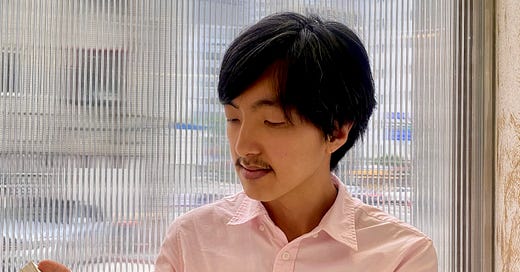I Began to Write Since I Failed to Become a Writer
Much Ado about Writing in Korean and English
I began to write since I failed to become a writer. This sentence requires two extra adverbial clauses to clear things up: I began to write in English since I failed to become a writer in South Korea.
It was only in May 2023, less than a year away from now, that an idea, too perfectly normal for most people on Substack that they almost never become self-conscious about it, crossed my mind. I, a Korean born and residing in South Korea, thought maybe I should try writing stories in English. At that point, I had finished a novel and dozens of short stories in Korean, my native tongue, and writing had been a serious pursuit of mine for some years. I had quit my job, had no intention of getting a “real” full-time job, and spent most of my days writing (or feeling guilty for looking at my phone the whole time) at a café near my ever-merciful girlfriend’s workplace, waiting for her to come get me and buy me dinner, which was quite often my only meal during the day (I will never be able to be grateful enough to her).
And of course, after all those years, not a single work of mine in Korean had gotten accepted and published. (What a cliché, and touché!)
I admit that I usually aimed only for the big magazines and newsletters. That reduced the probability. Another point to consider is that even if I take the most optimistic view, only about one hundred million potential readers of a literary work in Korean exist in this world―that number comes from adding up all the South Koreans, North Koreans, Korean-Americans, Korean-Chinese, Korean-Japanese, Koreans in the former USSR countries, etc., presuming that every single ethnic Korean knows how to, and cares to read anything in Korean. It is still a relatively small market.
Whatever I wrote above, however, did not change the fact that I failed to become a Korean writer, whatever that means.
The problem was that I could not simply say, ssibal, gwandunda. This graceful Korean expression translates into f*ck it, I’m done. I was so certain that I was talented, maybe even a genius, as if I had received a divine revelation or something. No hardship, or no reality, will stop St. Peter from going to Rome, or Muhammad from marching to Mecca, or a practically jobless aspiring writer who believes himself to be gifted and hasn’t been doing many things that could be useful for society from continuing what he has been doing all along. You get the idea.
That was how I began to write in English, but writing in English was not a goal in itself. At first, I wanted to check if my writing is so unacceptable, or if South Korean society as a whole is so bad a judge of literature. If whatever I wrote in English got accepted somewhere, I had the whole South Korea to blame for having terrible taste; if not, alas, I had the whole world and this generation that knows not what they do to blame. What could I lose?
About three months after I began to write in English (and familiarized myself with strange websites called Submittable and
), I received my first acceptance letter.I should confess that the acceptance letter was a source more of anger than joy. I was delighted to be published in a journal at last, but I felt hurt at the same time. Even if the whole world had no idea about it, at least I knew that what I wrote in Korean tended to be better than what I wrote in English. Yet, there were some people abroad who willingly welcomed my “worse” ones. Then what were all those rejections from the very society I live in supposed to mean?
As of now, I am not sure how to end this writing to avoid grumbling on and on. I believe I could mention that I have not written anything in Korean (that is, something I would consider a work of mine) since last summer. During this time, I had only one goal in submitting my works abroad.
Just give me that literary green card already.
I don’t usually write along my stream of consciousness, especially when I am working on a piece to submit somewhere. Writing for an hour straight without self-censorship was fun. In case you feel like my first piece in English that got accepted, here it is. Toska in the K-Pop Capital




Hyun, I always find it incredible when a non-native English speaker writes so well in English. I'm almost certain that what you write in Korean is amazing as well, because being able to write well in your second language is insanely difficult. I speak Spanish every day with my wife and I couldn't dream of writing anything halfway decent in Spanish. So, good on you. I'm subscribing.
Hi Hyun Woo! I just wanted to let you know that it's been totally fun reading your posts in English. As a Japanese-Chinese, I empathize with you. I know and understand the struggles of switching in between languages. There are times I feel restricted with just one language. The way you write is dazzling. It's a breath of fresh air. You don't need to be the next Nabokov. Be the first Hyun Woo Kim.